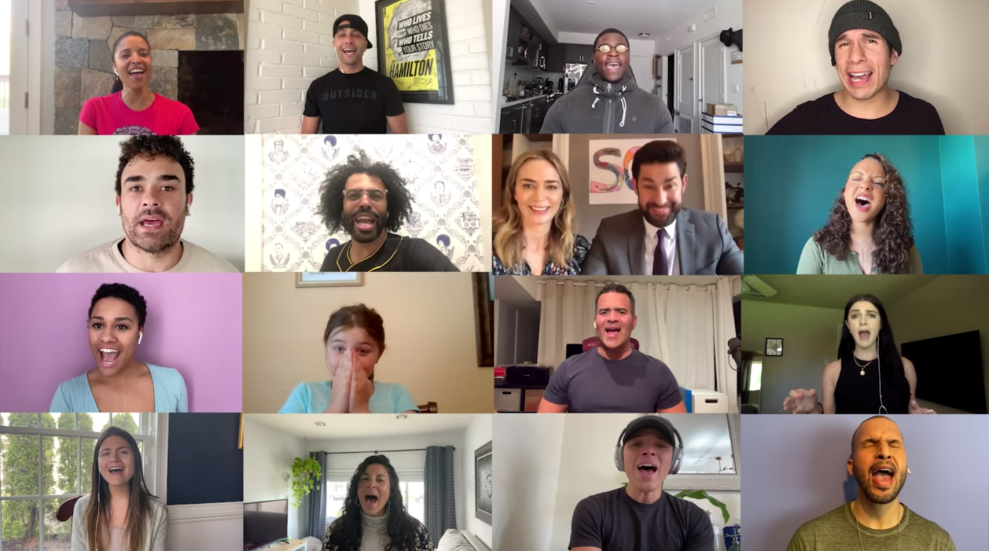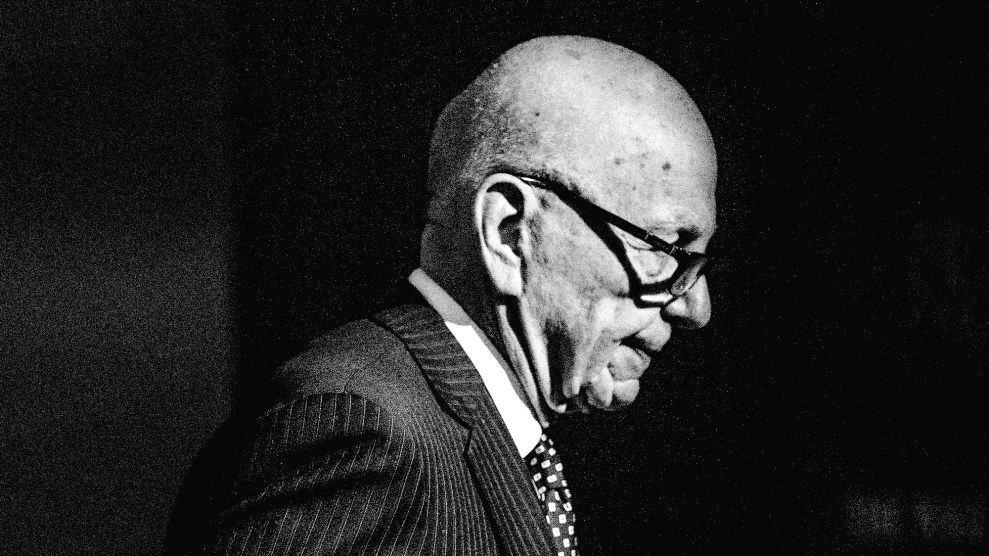
The original "Hamilton" cast joins actors John Krasinski and Emily Blunt to surprise a 9-year-old fan by serenading her over Zoom in the new YouTube show "Some Good News."Krasinski/Some Good News
Welcome to Recharge, a weekly newsletter full of stories that will energize your inner hellraiser. See more editions and sign up here.
As the wall-to-wall coverage and stark statistics about the coronavirus continue to test our stamina and resilience, there is still, and always will be, some good news, including Some Good News, the new YouTube show that launched last week to more than 13 million views. It highlights the selfless acts of courage by front-line workers, caretakers, and neighbors rising up to meet the moment’s challenges.
Hosted from home by actor John Krasinski as himself—but eternally Jim Halpert from The Office—the show puts him behind a desk again, this time with viewer-submitted, uplifting stories. We meet a 15-year-old girl returning home from chemotherapy to a surprise party of friends and neighbors social-distancing in parked cars, with welcome-back balloons and signs, cheering as she goes by. We meet a woman with Alzheimer’s separated from her husband but singing “Amazing Grace” with him through a hospital window—in perfect unison. We meet a homeowner placing bottles of hand sanitizer on his porch as giveaways for any delivery worker to take home.
The 15-year-old, making a strong recovery, tells him in a video chat, “To my nurses and doctors…Thank you.” “I don’t know if I can do another [episode of Some Good News] after this,” Krasinski tells her, “because you’re the best news there is. You’re like the mic drop of all good news.”
Episode 2 of Some Good News: the entire cast of Hamilton reuniting by Zoom to serenade a 9-year-old fan whose birthday was supposed to be spent seeing the show in person, before the shelter-in-place closures. So the stage came to her. #SomeGoodNews
Here are more Recharge stories to get you through the week:
There is sunshine. Singer-songwriter Bill Withers grew up with a stutter. More than 70 million people stutter, a condition that challenged his speech, his schoolwork, his self-esteem. But not his voice. Withers found his voice, and a creative way to express it, after the death of his father at age 13. Years later, he wrote the soul-stirring ballads “Ain’t No Sunshine,” “Lean on Me,” and “Grandma’s Hands,” with an intimacy, deeply felt emotional range, and pared-down lyricism we can turn to today. Withers, who died on Friday at 81, created a sound of sunshine, filtered by clouds, not just for his moment, but for ours. My colleague Beth Eisenstaedt wrote the other day that “sunlight is the best disinfectant.” Beth was talking about high-quality, fearless journalism right now. It’s equally true of high-quality, fearless blues, in this live recording and this one. I couldn’t choose between them, so tell me which stirs you more, at recharge@motherjones.com.
Stronger for it. WOC Space is a virtual community of women of color for socializing, supporting, and sharing tips, created by environmental ecologist Tiara Moore on a basic premise: courage can surmount injustice. That idea was tested last week, when the group was hacked by bigots shouting racial slurs. The twin toxins of racism and misogyny had adapted to Zoom, but WOC Space is designed to prevail. After rebooting, Moore vowed to stay strong by password-protecting the chats and growing the email list. “That’s what gave me the strength to persist,” Moore tells me. “Being the leader of this organization and being attacked in that manner was jarring—it’s the most unbelievable experience I’ve had, and I’m a black female in science: I’ve been through a whole lot! But never like that. I’ve interacted with more women of color via WOC Space than I had my entire time in a job where I don’t see women of color every day. We’re stronger for it.” The group’s membership, and resilience, continues to grow. (H/t The Root)
Cooking to cure. After 11 years of sharing video recipes from his New London, Connecticut, restaurant, Jack Chaplin was forced by the pandemic to adapt. He’s more than adapted. He’s made meals for homeless members of the community, cooked for families in need, donated kitchen equipment to firefighters over the years, and assembled pizza kits for curbside pickup. His beloved channel Daddy Jack’s Cooking With the Blues shares blues history, cooking tips, family milestones, and wisdom without any of the pretense common among certain celebrity chefs, and with all the depth, generosity, and solidarity this moment needs. “It’s a wonderful thing to see people come together and assist each other,” Chaplin tells me. This pandemic “could be a conduit for” stronger communities. He’s (finally!) launched a Patreon crowdfunding page for new and loyal followers. Head over—his best is ahead. (NBC Connecticut)
Near and far. Gabi Yetter, an author in the UK, wanted to do more than volunteer at a hospice and shop for groceries for neighbors and elder friends, which she does, so she created a Facebook group, “The Good in Us,” where 800 members share uplifting posts from South Africa, Cambodia, Hong Kong, Australia, France, the United States, and elsewhere—anything “that’s shining light,” Yetter tells me. “We are all connected around the world….I’m looking forward to the day when I can hug my friends and family again.” Until then, and after, “The Good in Us” is open to all.
This or that? As I take the wheel of Recharge, I’ll end with the question I raised above: Does this recording or that one recharge you more? Let me know at recharge@motherjones.com, and have a strong week ahead.










